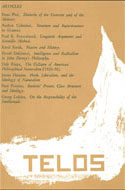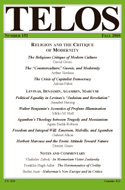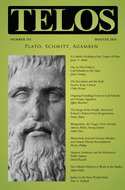By Lukas Szrot · Tuesday, March 24, 2015  Given the rich and diverse history in the discipline of philosophy, many a practicing philosopher might justifiably remark that insightful philosophical inquiry must withstand the test of time. Though “The Collapse of Philosophical Naturalism” was published in Telos in 1969, many of its insights remain highly relevant to conversations that continue in philosophical and sociopolitical circles today. Dale Riepe issues a damning critique, examining four at once distinct and kindred flaws in philosophical naturalism. Given the rich and diverse history in the discipline of philosophy, many a practicing philosopher might justifiably remark that insightful philosophical inquiry must withstand the test of time. Though “The Collapse of Philosophical Naturalism” was published in Telos in 1969, many of its insights remain highly relevant to conversations that continue in philosophical and sociopolitical circles today. Dale Riepe issues a damning critique, examining four at once distinct and kindred flaws in philosophical naturalism.
Continue reading →
By Katherine McGinity · Tuesday, October 9, 2012 As an occasional feature on TELOSscope, we highlight a past Telos article whose critical insights continue to illuminate our thinking and challenge our assumptions. Today, Katherine McGinity looks at Dimitri Ginev’s “The Erotic Attitude Toward Nature and Cognitive Existentialism” from Telos 152 (Fall 2010).
 Dimitri Ginev’s “The Erotic Attitude Toward Nature and Cognitive Existentialism” seeks to uncover ways in which Herbert Marcuse’s call for a “new science” could be achieved in current scientific research. Marcuse’s ideas are committed to an “erotic” attitude toward nature that moves away from the technological rationality that drives scientific research. Marcuse posits that engaging in an erotic attitude toward nature would allow natural entities to “be what they are” and reveal their inherent aesthetic qualities. According to Marcuse, this dramatic shift in scientific research would change essentialist thinking about science and its norms of objectivity. Ginev shares Marcuse’s feeling that current scientific research methods are problematic in their reductive approach to nature as something that can be controlled and manipulated. However, Ginev points out that attempting to dismantle the subjective-objective structure of modern science proves difficult based solely in Marcuse’s outline. Dimitri Ginev’s “The Erotic Attitude Toward Nature and Cognitive Existentialism” seeks to uncover ways in which Herbert Marcuse’s call for a “new science” could be achieved in current scientific research. Marcuse’s ideas are committed to an “erotic” attitude toward nature that moves away from the technological rationality that drives scientific research. Marcuse posits that engaging in an erotic attitude toward nature would allow natural entities to “be what they are” and reveal their inherent aesthetic qualities. According to Marcuse, this dramatic shift in scientific research would change essentialist thinking about science and its norms of objectivity. Ginev shares Marcuse’s feeling that current scientific research methods are problematic in their reductive approach to nature as something that can be controlled and manipulated. However, Ginev points out that attempting to dismantle the subjective-objective structure of modern science proves difficult based solely in Marcuse’s outline.
Continue reading →
By Mark Chou · Friday, January 20, 2012 Mark Chou’s “Morgenthau, the Tragic: On Tragedy and the Transition from Scientific Man to Politics Among Nations” appears in Telos 157 (Winter 2011). Read the full version online at the TELOS Online website, or purchase a print copy of the issue here.
 When Hans J. Morgenthau first penned Scientific Man vs. Power Politics, it was his scorn of modern science or “dogmatic scientism,” as he put it, that spoke most loudly. But with the publication of Politics Among Nations several years later, his concerns had shifted, as he set about to present a rational theory of international politics. In a matter of only two years, or so it seemed, Morgenthau’s tune had changed—from a clear denunciation of science to the espousal of a nascent science of International Relations. Why did Morgenthau so vehemently decry dogmatic scientism and all that it embodied in Scientific Man, only to establish a theory of international politics that would eventually inspire the “science” of International Relations? The answer, at least the one that this article entertains, was tragedy. Using the lens of tragedy, which Morgenthau first embraced in Scientific Man, this article offers a narrative of the seemingly paradoxical transition that occurs between Scientific Man and Politics Among Nations. When Hans J. Morgenthau first penned Scientific Man vs. Power Politics, it was his scorn of modern science or “dogmatic scientism,” as he put it, that spoke most loudly. But with the publication of Politics Among Nations several years later, his concerns had shifted, as he set about to present a rational theory of international politics. In a matter of only two years, or so it seemed, Morgenthau’s tune had changed—from a clear denunciation of science to the espousal of a nascent science of International Relations. Why did Morgenthau so vehemently decry dogmatic scientism and all that it embodied in Scientific Man, only to establish a theory of international politics that would eventually inspire the “science” of International Relations? The answer, at least the one that this article entertains, was tragedy. Using the lens of tragedy, which Morgenthau first embraced in Scientific Man, this article offers a narrative of the seemingly paradoxical transition that occurs between Scientific Man and Politics Among Nations.
Continue reading →
By Michael Marder · Wednesday, December 8, 2010 For the past twenty years, a sizeable segment of analytic philosophy has been openly promoting naturalization, a process that has implicitly defined the goals of this philosophical strand since its very inception. The object of naturalization is so diffuse as to include epistemology and phenomenology, jurisprudence and education, power and responsibility, and, indeed, any human phenomenon whatsoever. The sheer extent of this devastating trend makes it a good candidate for close critical scrutiny, which can help us diagnose the condition of analytic thought, structurally incapable of a sober self-assessment, and to explain its pernicious political consequences.
Continue reading →
|
|
 Given the rich and diverse history in the discipline of philosophy, many a practicing philosopher might justifiably remark that insightful philosophical inquiry must withstand the test of time. Though “The Collapse of Philosophical Naturalism” was published in Telos in 1969, many of its insights remain highly relevant to conversations that continue in philosophical and sociopolitical circles today. Dale Riepe issues a damning critique, examining four at once distinct and kindred flaws in philosophical naturalism.
Given the rich and diverse history in the discipline of philosophy, many a practicing philosopher might justifiably remark that insightful philosophical inquiry must withstand the test of time. Though “The Collapse of Philosophical Naturalism” was published in Telos in 1969, many of its insights remain highly relevant to conversations that continue in philosophical and sociopolitical circles today. Dale Riepe issues a damning critique, examining four at once distinct and kindred flaws in philosophical naturalism.  Dimitri Ginev’s “The Erotic Attitude Toward Nature and Cognitive Existentialism” seeks to uncover ways in which Herbert Marcuse’s call for a “new science” could be achieved in current scientific research. Marcuse’s ideas are committed to an “erotic” attitude toward nature that moves away from the technological rationality that drives scientific research. Marcuse posits that engaging in an erotic attitude toward nature would allow natural entities to “be what they are” and reveal their inherent aesthetic qualities. According to Marcuse, this dramatic shift in scientific research would change essentialist thinking about science and its norms of objectivity. Ginev shares Marcuse’s feeling that current scientific research methods are problematic in their reductive approach to nature as something that can be controlled and manipulated. However, Ginev points out that attempting to dismantle the subjective-objective structure of modern science proves difficult based solely in Marcuse’s outline.
Dimitri Ginev’s “The Erotic Attitude Toward Nature and Cognitive Existentialism” seeks to uncover ways in which Herbert Marcuse’s call for a “new science” could be achieved in current scientific research. Marcuse’s ideas are committed to an “erotic” attitude toward nature that moves away from the technological rationality that drives scientific research. Marcuse posits that engaging in an erotic attitude toward nature would allow natural entities to “be what they are” and reveal their inherent aesthetic qualities. According to Marcuse, this dramatic shift in scientific research would change essentialist thinking about science and its norms of objectivity. Ginev shares Marcuse’s feeling that current scientific research methods are problematic in their reductive approach to nature as something that can be controlled and manipulated. However, Ginev points out that attempting to dismantle the subjective-objective structure of modern science proves difficult based solely in Marcuse’s outline.  When Hans J. Morgenthau first penned Scientific Man vs. Power Politics, it was his scorn of modern science or “dogmatic scientism,” as he put it, that spoke most loudly. But with the publication of Politics Among Nations several years later, his concerns had shifted, as he set about to present a rational theory of international politics. In a matter of only two years, or so it seemed, Morgenthau’s tune had changed—from a clear denunciation of science to the espousal of a nascent science of International Relations. Why did Morgenthau so vehemently decry dogmatic scientism and all that it embodied in Scientific Man, only to establish a theory of international politics that would eventually inspire the “science” of International Relations? The answer, at least the one that this article entertains, was tragedy. Using the lens of tragedy, which Morgenthau first embraced in Scientific Man, this article offers a narrative of the seemingly paradoxical transition that occurs between Scientific Man and Politics Among Nations.
When Hans J. Morgenthau first penned Scientific Man vs. Power Politics, it was his scorn of modern science or “dogmatic scientism,” as he put it, that spoke most loudly. But with the publication of Politics Among Nations several years later, his concerns had shifted, as he set about to present a rational theory of international politics. In a matter of only two years, or so it seemed, Morgenthau’s tune had changed—from a clear denunciation of science to the espousal of a nascent science of International Relations. Why did Morgenthau so vehemently decry dogmatic scientism and all that it embodied in Scientific Man, only to establish a theory of international politics that would eventually inspire the “science” of International Relations? The answer, at least the one that this article entertains, was tragedy. Using the lens of tragedy, which Morgenthau first embraced in Scientific Man, this article offers a narrative of the seemingly paradoxical transition that occurs between Scientific Man and Politics Among Nations. 






